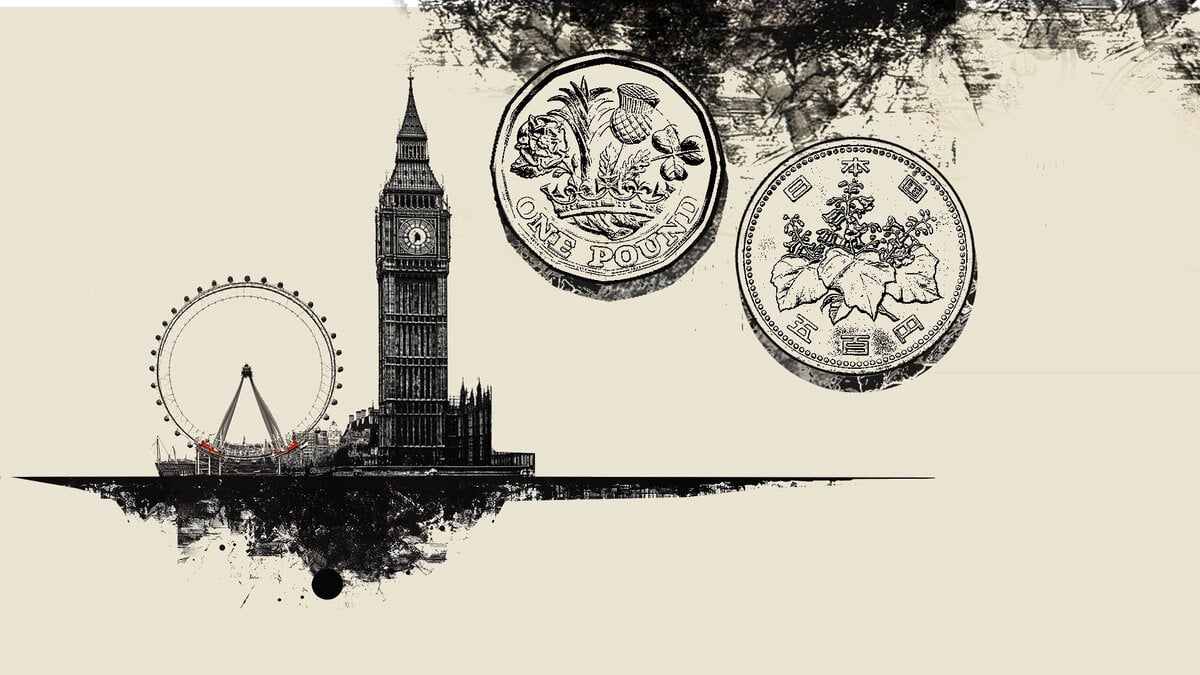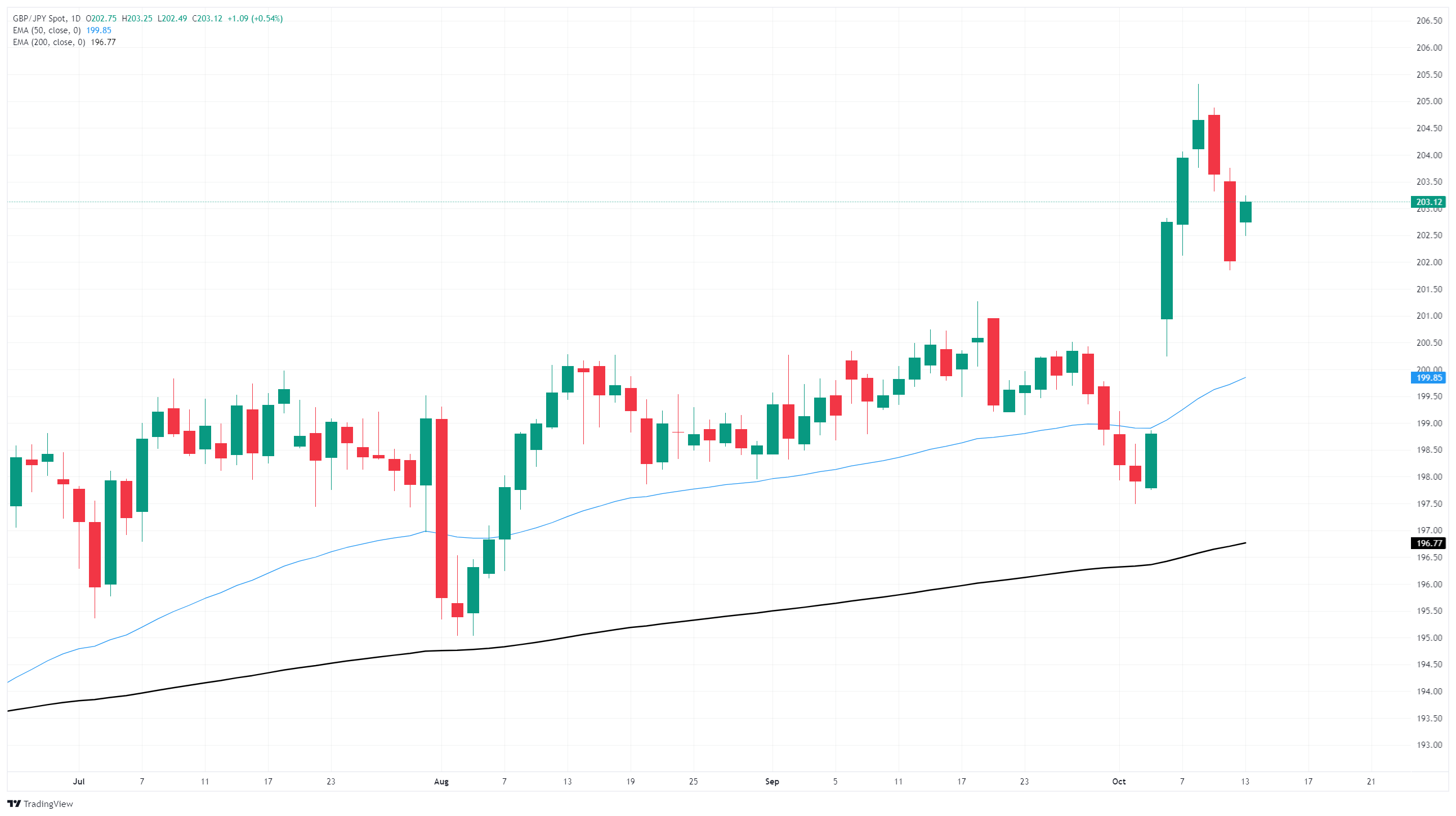Created
: 2025.10.14














![]() 2025.10.14 03:44
2025.10.14 03:44
GBP/JPY roiled on Monday, churning chart paper near the 203.00 handle after arresting a two-day backslide from 15-month highs above 205.00. The Guppy pair is still holding well on the high end of a near-term bullish surge that has the Pound Sterling (GBP) up over 2% against the Japanese Yen (JPY) in October.
This week's economic data docket on the Japanese side remains thin and and limited, but Pound traders will be facing down the latest labor data updates from the UK on Tuesday. GBP markets are hoping that the UK's 3-month ILO Unemployment Rate will hold at 4.7% in September.
The Bank of England (BoE) has been steadily cutting its interest rate since Q3 2024, delivering a steady stream of three interest rate cuts through 2025, and the UK's central bank is broadly expected to deliver further rate cuts through the end of the year and into 2026 as the BoE grapples with a lopsided economic stop-and-start. This week's labor data reading will provide GBP traders with a fresh take on the state of the UK economy before fine-tuning rate cut expectations.
The GBP/JPY daily chart has shown a clear shift in momentum over the past two weeks. After sliding below the 50-day Exponential Moving Average (EMA) in late September, the pair found support near 197.00 and staged a strong rebound. The rally accelerated once price reclaimed the 50-day EMA around 199.85, pushing quickly toward 205.00 before easing back.
The recent pullback looks more like a pause than a full reversal. Price is holding above the 50-day EMA, suggesting that buyers remain in control for now. The 200-day EMA, down near 196.77, continues to slope upward, providing longer-term trend support.
Short-term sentiment leans bullish while the pair trades above 200.00, but traders will be watching to see if GBP/JPY can clear resistance near 205.00 again. A decisive move through that level could open the door to a retest of the summer highs, while a close back below 199.50 would signal fading momentum and a possible return to the broader range.

The Pound Sterling (GBP) is the oldest currency in the world (886 AD) and the official currency of the United Kingdom. It is the fourth most traded unit for foreign exchange (FX) in the world, accounting for 12% of all transactions, averaging $630 billion a day, according to 2022 data. Its key trading pairs are GBP/USD, also known as 'Cable', which accounts for 11% of FX, GBP/JPY, or the 'Dragon' as it is known by traders (3%), and EUR/GBP (2%). The Pound Sterling is issued by the Bank of England (BoE).
The single most important factor influencing the value of the Pound Sterling is monetary policy decided by the Bank of England. The BoE bases its decisions on whether it has achieved its primary goal of "price stability" - a steady inflation rate of around 2%. Its primary tool for achieving this is the adjustment of interest rates. When inflation is too high, the BoE will try to rein it in by raising interest rates, making it more expensive for people and businesses to access credit. This is generally positive for GBP, as higher interest rates make the UK a more attractive place for global investors to park their money. When inflation falls too low it is a sign economic growth is slowing. In this scenario, the BoE will consider lowering interest rates to cheapen credit so businesses will borrow more to invest in growth-generating projects.
Data releases gauge the health of the economy and can impact the value of the Pound Sterling. Indicators such as GDP, Manufacturing and Services PMIs, and employment can all influence the direction of the GBP. A strong economy is good for Sterling. Not only does it attract more foreign investment but it may encourage the BoE to put up interest rates, which will directly strengthen GBP. Otherwise, if economic data is weak, the Pound Sterling is likely to fall.
Another significant data release for the Pound Sterling is the Trade Balance. This indicator measures the difference between what a country earns from its exports and what it spends on imports over a given period. If a country produces highly sought-after exports, its currency will benefit purely from the extra demand created from foreign buyers seeking to purchase these goods. Therefore, a positive net Trade Balance strengthens a currency and vice versa for a negative balance.
![]()
Created
: 2025.10.14
![]()
Last updated
: 2025.10.14

FXStreet is a forex information website, delivering market analysis and news articles 24/7.
It features a number of articles contributed by well-known analysts, in addition to the ones by its editorial team.
Founded in 2000 by Francesc Riverola, a Spanish economist, it has grown to become a world-renowned information website.
We hope you find this article useful. Any comments or suggestions will be greatly appreciated.
We are also looking for writers with extensive experience in forex and crypto to join us.
please contact us at [email protected].
Disclaimer:
All information and content provided on this website is provided for informational purposes only and is not intended to solicit any investment. Although all efforts are made in order to ensure that the information is correct, no guarantee is provided for the accuracy of any content on this website. Any decision made shall be the responsibility of the investor and Myforex does not take any responsibility whatsoever regarding the use of any information provided herein.
The content provided on this website belongs to Myforex and, where stated, the relevant licensors. All rights are reserved by Myforex and the relevant licensors, and no content of this website, whether in full or in part, shall be copied or displayed elsewhere without the explicit written permission of the relevant copyright holder. If you wish to use any part of the content provided on this website, please ensure that you contact Myforex.
Myforex uses cookies to improve the convenience and functionality of this website. This website may include cookies not only by us but also by third parties (advertisers, log analysts, etc.) for the purpose of tracking the activities of users. Cookie policy